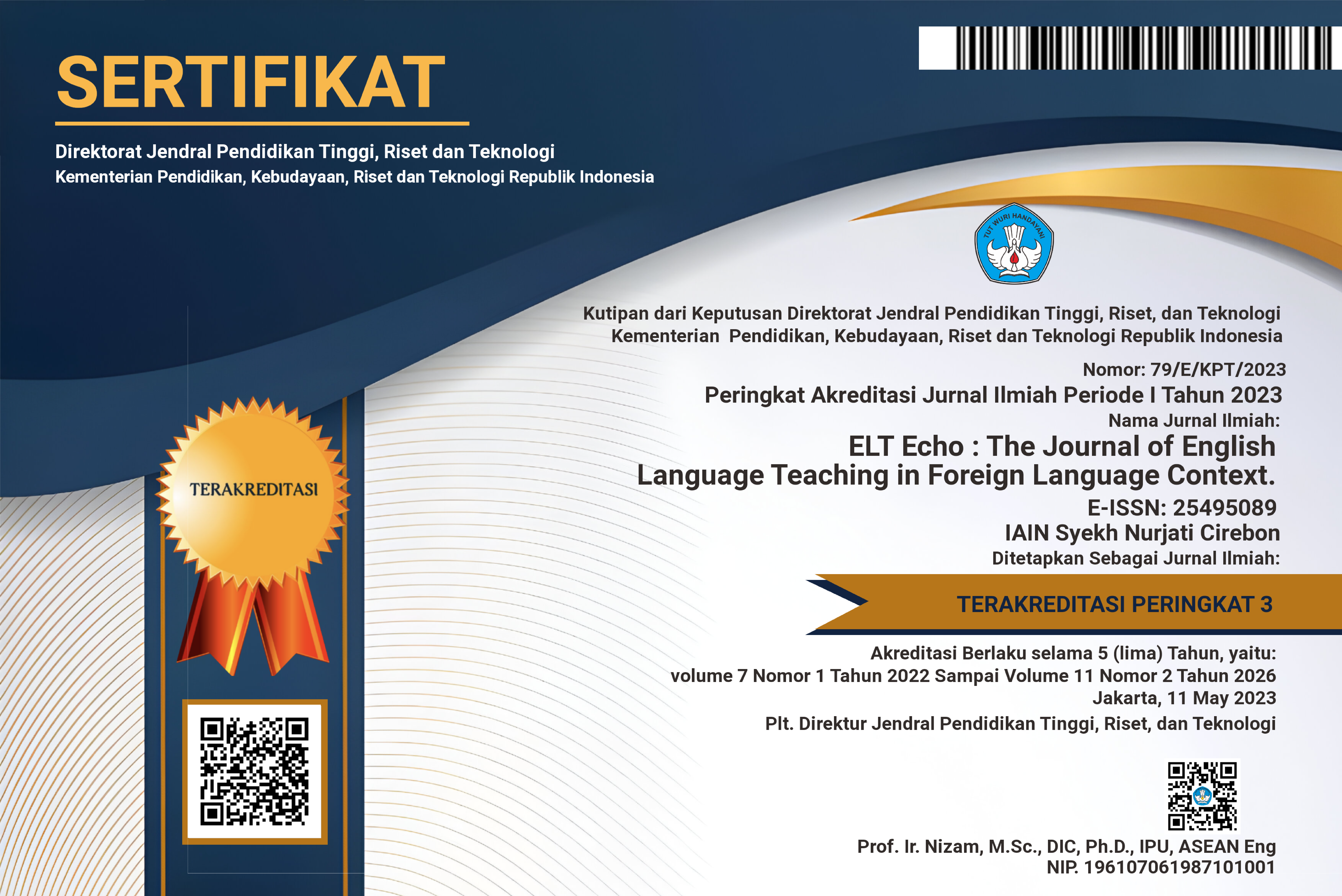Undergraduate Students’ Perception of Lecturers Written Corrective Feedback in the Process of Writing Undergraduate Thesis
(1) Universitas Islam Indonesia
(2) Universitas Islam Indonesia
(*) Corresponding Author
Abstract
Keywords
Full Text:
PDFReferences
Cárcamo. B. (2020). Classifying Written Corrective Feedback for Research and Educational Purposes: A Typology Proposal. Profile: Issues in Teachers’ Professional Development. 22(2). 211–222. https://doi.org/10.15446/profile.v22n2.79924
Chen. S., Nassaji, H. Liu, Q. (2016). EFL learners’ perceptions and preferences of written corrective feedback: a case study of university students’ from Mainland China. Asian-Pacific Journal of Second and Foreign Language Education. 1 (5). https://dx.doi.org/10.1186/s40862-016-v0010-y
Ganapathy, M., Lin, D.T.A., & Phan, J. (2020). Students’’ perceptions of teachers’ written corrective feedback in the Malaysian ESL classroom. Malaysian Journal of Learning and Instruction, 17(2), 103-136
Gürbüz, S. (2017). Survey as a quantitative research method. Research Methods and Techniques in Public Relations and Advertising, 2017, 141-62.
Kencana. A. T. A. (2020). Students’’ preferences and teachers’ beliefs towards written corrective feedback. Journal of English Language Teaching. 9 (1). 85-95. https://doi.org/10.15294/elt.v9i1.37187
Lim. S.C. & Renandya. W. A. (2020). Efficacy of Written Corrective Feedback in Writing Instruction: A Meta-Analysis. The Electronic Journal for English as a Second Language, 24 (3), 1-26.
Linh. M. (2018). The Effectiveness of Indirect Written Corrective Feedback as Perceived By Teachers and Students’ of a Public University in Vietnam. International Journal of Education & Literacy Studies. 6 (4). 153-162
Mahmood, Q. (2021). Kurdish EFL Learners’ Perceptions towards Written Corrective Feedback and Its Types: An Investigative Study. Arab World English Journal (AWEJ), 12 (4), 103-117. https://dx.doi.org/10.24093/awej/vol12no4.7
Marrs, S. (2016). Development of the students’’ perceptions of writing feedback scale (Unpublished Doctoral’s Dissertation). Virginia Commonwealth University. Retrieved from https://scholarscompass.vcu.edu/etd/4404/
Mulati. D. F., Nurkamto. J., & Drajati. N. A. (2020). The Teachers’ Beliefs in Teachers’ Corrective Feedback on the Students’’ Writing. Journal of Applied Linguistics and Literature. 5 (1). 1-10. http://dx.doi.org/10.33369/joall.v5i1.7644
Rahim. S. A., Jaganathan. S., Mahadi. T. S. T. (2019). Students’’Experiences in L2 Writing and Their Opinion on Written Corrective Feedback. International Journal of Language, Literacy and Translation. 2 (1). 68-76
Ramadhani. G. S. R., Muth’im. A., Febriyanti. E. R. (2021). Students’’ Preferences towards Lecturer’s Written Corrective Feedback in Writing Class. Atlantis Press Advances in Social Science, Education and Humanities Research. 587. 63-71
Saeli, H. & Cheng, A. (2019). Student Writers’ Affective Engagement with Grammar-Centred Written Corrective Feedback: The Impact of (Mis)Aligned Practices and Perceptions. Canadian Journal of Applied Linguistics / Revue canadienne de linguistique appliquée, 22(2), 109–132. https://doi.org/10.7202/1065058ar
Salami, A.F. & Khadawardi, A.H. (2022). Written Corrective Feedback in Online Writing Classrooms: EFL Students’ Perceptions and Preferences. International Journal of English Language Teaching. 10 (2). 12-35
Saragih, N, A., Madya, S., Siregar, R.A., Saragih, W. (2021). Written corrective feedback: students’’ perception and preferences. International Online Journal of Education and Teaching (IOJET), 8(2). 676-690.
Sari. D. M. M. (2019). The Effectiveness of Corrective Feedback to the Students’’ Grammatical Construction on Paragraph Writing Class. Journal of English Educational Study. 2 (2). 122-131
Tursina, P., Chuang, M. T., Susanty, H., Silmawati, S., & Effendi, Z. (2019). EFL students’’ preference in receiving written corrective feedback. Indonesian Journal of Learning and Instruction, 2(2), 23-32. http://dx.doi.org/10.25134/ijli.v2i2.1990.
Wahyuningsih. S. (2020). The Role of Corrective Feedback on Academic Writing Performance: EFL Students’ Perceptions. Jurnal Linguistiks Terapan dan Pendidikan Bahasa Inggris. 7 (1). 14-21
Wang Xin. (2017). The Effects of Corrective Feedback on Chinese Learners’ Writing Accuracy: A Quantitative Analysis in an EFL Context. World Journal of Education. 7 (2). https://dx.doi.org/10.5430/wje.v7n2p74
Wisniewski B, Zierer K and Hattie J. (2020). The Power of Feedback Revisited: A Meta-Analysis of Educational Feedback Research. Front. Psychol. 10:3087. https://dx.doi.org/10.3389/fpsyg.2019.03087
Zhang, T. Chen, X. Hu, J. Ketwan, P. (2021). EFL Students’’ Preferences for Written Corrective Feedback: Do Error Types, Language Proficiency, and Foreign Language Enjoyment Matter. Front Psychol. 12:660564. https://dx.doi.org/10.3389/fpsyg.2021.660564
DOI: 10.24235/eltecho.v8i2.13399
Article Metrics
Abstract view : 57 timesPDF - 12 times
Refbacks
- There are currently no refbacks.
Â
This Journal is indexed by:
Â

This work is licensed under a Creative Commons Attribution 4.0 International License.










